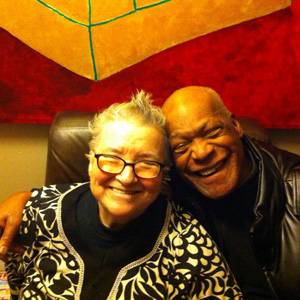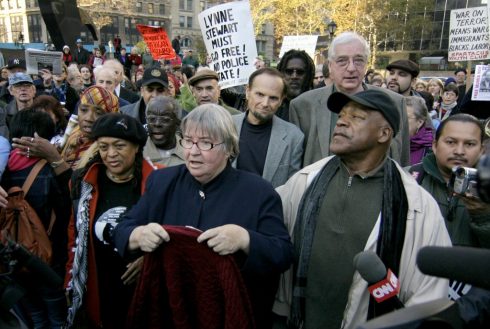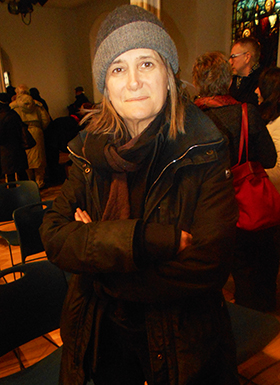The Late Lynne Stewart

Lynne Stewart on her website (one with her husband Ralph Poynter) not long before she died.

The Blind Shiek, Stewart’s most famous defendant, died Feb.18 –about 3 weeks before Stewart’s passing.

Photo of Lynne Stewart and husband Ralph Poynter at rally in lower Manhattan before she was imprisoned for helping “blind shiekh,” a convicted terrorist, communicate with his followers in Egypt.
By Mary Reinholz
Detractors of the late Lynne Stewart view her as a disbarred mouthpiece for evildoers who was imprisoned for helping a convicted terrorist communicate with his violent followers in Egypt. Her mostly leftist supporters revere the once prominent lawyer from Manhattan’s Lower East Side as a zealous defender of the poor and the grievously oppressed.
During a funeral service held March 11 at St. Mark’s Church-in-the-Bowery, dozens of them joined Stewart’s relatives and friends in mourning her death and celebrating her life as an activist. They made it plain that Stewart did not go gently into that good night. Nor would they.
“She had tremendous love and she taught us not to be afraid,” said Zenobia Brown, Stewart’s physician daughter by Ralph Poynter, her longtime second husband. “We will not be going quietly and we will make mom proud– whether it’s for helping political prisoners or [providing] financial support” for her varied left-wing causes.

Stewart’s casket
Stewart, a daughter of school teachers who grew up in Queens, had served more than four years of a ten-year sentence for materially aiding terrorism when, on New Year’s eve in 2013, she was granted compassionate release from a Texas prison for terminal breast cancer. She was 77 when she died March 7 at her Brooklyn home.
The Rev. Winnie Varghese, former rector at St. Mark’s, gave the homily at her funeral. She said that Stewart’s reservoir of “fierce love” spilled over to her controversial clients– “people we were not supposed to see, criminals,” Varghese added, apparently alluding to the aforementioned terrorist, Omar Abdel Rahman. The so-called “blind sheikh” was slapped with a life sentence of solitary confinement in 1995 for inciting the first World Trade Center bombing two years earlier, and for plotting to blow up New York City landmarks. Stewart was asked to represent him at his trial by former Attorney General Ramsey Clark. She believed Abdel Rahman was innocent and wept in court at his conviction. The sheikh died Feb. 18.
Stewart’s other controversial clients charged with serious crimes included Black Panthers, members of the Weather Underground and cop shooter Larry Davis. Varghese asked the congregants to help her understand what it would be like for Stewart, an avowed atheist who believed in armed struggle to foster revolution, to “be received into the house of God.” She called on them to imagine and say out loud who would welcome and love the former Harlem teacher and librarian “at the pearly gates.”

Pallbearers and priest with Stewart’s casket.
A cacophony of voices erupted over the next few minutes as people shouted out the names of rebel heroes likely to embrace Stewart in the Great Beyond: “Rosa Parks!” “Medgar Evers!” “Crazy Horse!” “Che Guevara!” murmured a fashionably dressed woman next to me in the third row. “Malcolm X!” roared a man behind me. “Betty Shabazz!” “Muhammad Ali!” Another man bellowed “Ralph Poynter!” The reference to Stewart’s husband, who was in attendance, drew laughter from the overflow crowd at the liberal church.
Otherwise, it was a traditional Episcopal sendoff that included a Bach cantata delivered by the Spirit Bassoons and readings from the Book of Common Prayers. The hour-long service was officiated by the Rev. Dr. Allison Moore, interim pastor at St. Mark’s. “Lynne and Ralph didn’t believe in God, but Ralph said that this church offered a community,” Moore said, noting that the couple attended services regularly after Stewart’s release from prison. “We’re for social justice.”
The funeral ended with the tolling of bells as pallbearers lifted Stewart’s casket and transported it to a waiting hearse to be taken for burial at Green-Wood Cemetery in Brooklyn. When some of the elderly people filed out of the church, several raised their fists in a black power salute as they joined in with the St. Mark’s Chorus in singing the recessional hymn, “I’ll Fly Away.” They were greeted outside by a cadre of Stewart’s supporters, some carrying signs with slogans like “Rest in Power,” “Lynne Stewart Presente” and “Claim Freedom.” Asked what Stewart meant to them, an African-American woman uttered one word: “Courage.”
Amy Goodman, who co-hosts Democracy Now!, the independent radio, television and internet news program, observed the scene. We spoke about how Stewart was first hit with a 2002 federal indictment that charged her with two counts of materially aiding terrorism and three counts of defrauding the government in large part because of a 2000 press statement she had phoned to a Reuters reporter in Cairo on behalf of Abdel Rahman. She was arrested and handcuffed by FBI agents at her Brooklyn townhouse, pled not guilty in a court hearing and was released on $500,000 bail. Stewart soon admitted to reporters that she had violated prison rules known as SAMS (Special Administrative Measures) that severely restricted the sheikh’s contact with the outside world.

Amy Goodman
In the press statement, Abdel Rahman expressed his view that his followers in the Islamic Group, designated by the U.S. as a terrorist network, should consider withdrawing its ceasefire with the Egyptian government. No violence resulted from Stewart’s press statement from the sheikh, but assistant U.S. Attorney Andrew S. Dember, the lead prosecutor in lower Manhattan in the case, described it as a “call to arms” directed at the IG and leveled additional charges against her and two co-defendants. They were charged in a superseding indictment a year later.
Dember took this action after Stewart’s trial judge dismissed the two terrorism charges against her in 2002 as “constitutionally vague.” The superseding indictment accused her of supporting a conspiracy by IG to kidnap and kill
people abroad. (IG had taken responsibility for slaughtering at least 70 people, 60 of them tourists, at an ancient temple in Luxor, Egypt in 1997 as part of its campaign to overthrow the Egyptian government.)
Stewart told this reporter that her intent in issuing the press statement for the sheikh was to keep his name in the news, ease his isolation and facilitate his transfer to a prison in Egypt. She strongly rejected Dember’s allegations that she was trying to help the IG commit violent acts, noting sardonically that just because she had once defended mob turncoat Salvatore (“Sammy The Bull”) Gravano did not mean she was a “murderous moll from Bensonhurst.”
Did Goodman, who had also interviewed Stewart many times, believe she had made a tactical error in flouting the SAMS which she signed under oath? Goodman didn’t quite answer my question, but suggested that Stewart, known on the left as a people’s lawyer, had become a casualty of “the political climate” in the aftermath of 9/11.
Prominent criminal defense lawyer Ron Kuby, a friend of Stewart’s who had briefly represented Abdel Rahman with his late partner Bill Kunstler, the civil liberties icon, offered a similar assessment from his law office. “Lynne Stewart was judged by a post-9/11 standard and by the Bush administration for conduct that took place during the Clinton pre-9/11 [administration],” he said in a phone conversation. Kuby was apparently referring to visits Stewart made to the sheikh’s prison cell in 2000 and 2001 with her co-defendants, an Arabic translator and paralegal, which the government had secretly videotaped. “She had the expectation that the worst that could happen to her was having her visiting privileges restricted, and no more.”
Instead, Stewart was convicted on all five charges against her by an anonymous jury in 2005 after a 7-month trial in U.S. District Court in Foley Square. The trial judge, John G. Koeltl, citing Stewart’s work for the poor and the unpopular, handed her a 28-month sentence in 2009, infuriating the government prosecutors. The U.S. Second Circuit Court of Appeals, which upheld her conviction, vacated Koeltl’s sentence and ordered him to reconsider another one. In 2010, he stiffened her time behind bars to 10 years, contending among other claims that Stewart had failed to show sufficient remorse for her actions. Koeltl quoted her jaunty comment to supporters that she could do 28 months “standing on my head.”
Kuby believes that Koeltl might never have granted Stewart compassionate release had her supporters not mounted an international petition drive calling attention to her good deeds over the years and her stage 4 breast cancer. It drew celebrities to the cause. The appeals panel, he said, “wanted to give her 30 years.”
Why Stewart took such a risk in defying the SAMS remains unclear. Journalist Bill Weinberg, who lives in the East Village, questioned her closely on this subject in 2003 for his website World War 3 Report (now called Countervortex). Over the weekend, he recalled that Stewart felt that “the SAMS were draconian and, in fact, unconstitutional. Did she consciously lie when signing the SAM? Or did she decide later that she could not in good conscience abide by it? I don’t know. I would assume the latter.”
Weinberg added that he considered Stewart’s views on political Islam as “idealized and naive.” Nonetheless, he refused to hand over the tapes, transcripts and notes of his interview with Stewart when James B. Comey, then U.S. Attorney for the Southern District and now FBI director, threatened him with a subpoena if he failed to comply. He retained a lawyer from the New York City chapter of the leftist National Lawyers Guild. Comey backed down, Weinberg said.
“It was an honor to stand up to the threats of James Comey on behalf of Lynne’s rights and my own,” he said in an email yesterday. He lauded Stewart as a “fighting activist attorney” in his online obit last week.
Stewart is survived by another daughter and a lawyer son by her first husband, Robert Stewart, and by a sister, a brother, and six grandchildren, according to the New York Times.
A version of this story first appeared in Bedford+Bowery,a website of New York Magazine.
Comments
Leave a Reply
You must be logged in to post a comment.



